Neurodivergent workers: taking advantage and overcoming challenges

This page is for both autistic employees and any managers or employers who may not be aware that they have autistic people on their staff, and can take some simple but effective steps to improve the company performance.
If you don't know what autism is, or if you are convinced that autistic people are necessarily those who silently sit in a corner and do not react to external stimuli (or geniuses who multiply in their mind any numbers and are able to hack any server), please read The wrong planet syndrome.
TO THE ATTENTION OF WORKERS: If you have noticed that at work you find it hard to do what others do easily (and/or vice versa - you have no problem doing work that is difficult for your colleagues), then perhaps you are on autism spectrum, although you do not suspect it because you don't fall under the above-mentioned extreme stereotypes.
TO THE ATTENTION OF MANAGERS AND EMPLOYERS: Autistic employees are considered to have certain strengths such as attention to detail, deep focus and concentration, tendency to follow rules and routines, good-natured attitude and disinclination to conflicts, trustworthiness and reliability, strong sense of work ethic, methodical approach, catching logical inconsistencies, creative thinking and finding unexpected non-standard solutions. Many autists are pattern seekers, have strong visual memory and can teach selves almost anything. Neurodivergent people see the world from a different perspective, challenge norms, create and innovate and add purposeful value.
There are stuffing agencies that specialize in hunting autistic brains, such as HireAutism.org, Auticon.ca, XCeptional.io, TheInclusiveWorkplace.ca, FocusPS.ca, Mentra.me, SpecialistErne.com, Aspiritech.org, Nitw.org etc. Many hi-tech companies have special programs for hiring neurodivergent talent: Google, IBM, DELL, HP, SAP, Oracle etc. Some of these companies were themselves founded by autists: Microsoft, Facebook, Tesla.
Like any other phenomenon, autism has its advantages and difficulties. Because human society is built on the principles of neurotypical (i.e. non-autistic) people, autism is often accompanied by difficulties, both for autists and for those around them. Of course, the problems are not caused by autism itself, but by differences in information perception and mutual misunderstanding. Therefore, we can just as easily say that the cause of autistic people's problems lies in their neurotypical environment. If two people who do not understand each other's language meet, neither of them is more or less to blame for the misunderstanding than the other. Moreover, neither of them is to blame at all, and instead of looking for the guilty party, we should look for ways to solve the problem. The difficulties autistic people and their environment face at work can be overcome if you are armed with knowledge. That is what this page is dedicated to.
Contents:
• Thinking not wrong but differently. This can (and should!) be monetized
• To managers and supervisors: Communicate clear and unambiguous expectations
• To managers and supervisors: Check for understanding
• Asking clarifying questions by autists
• Limited abstract, analytical and strategic thinking
• Focus on one task - key to success. Multitasking - key to failure
• Work may be interrupted not only by other tasks, but also... by the manager
• Information processing speed and slower work pace
• Decidophobia - decision-making indecisiveness and anxiety
• Seeing once is better than hearing twice
• Problems with job interview and employment
• Disclosure of the diagnosis at work and legal aspects
Note that all autistic people are different - just as all non-autistic people are different. Both the advantages and the difficulties listed on this page may exist in different people to a greater or lesser extent, and some may not exist at all. Everything is described based not only on my own experience, but also on information about other autistic people found on the Internet. Therefore, the traits described can be called typical or at least very common, but by no means mandatory.
Thinking not wrong but differently. This can (and should!) be monetized
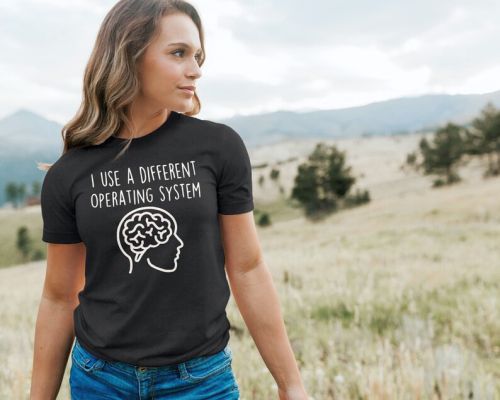
"When people with Asperger's Syndrome take an interest in certain things and they become proficient in them. They study the subject and know it in a great deal of detail and can recall that detail to others with ease. They see it as something that they want to know about and will take the time to fully understand it right down to the finer points. In addition, they have a high level of skills in many areas, such as numeracy, technology and design to name a few and these skills and their expertise make them valuable employees for companies looking to develop new products, processes and systems. This ability to think outside the box and visualise new ideas adds to their skills and employability." (The source)
From Accessing neurodiverse talent key to filling skills gap:
"Neurodiverse people, such as those with a diagnosis of autism spectrum condition, often have exceptional skills such as pattern recognition, logical thinking, central coherence (attention to detail) and accuracy, which make autistic candidates strong contenders for many STEM roles requiring these capabilities.
It is no secret that the more diverse a team is, the more successful and productive it is likely to be. By committing to optimising inclusivity, organisations stand to maximise their access to the best talent. In order to kickstart this process, it is crucial that businesses recognise and understand where significant barriers may be present in their organisation so they can be overcome. Often the changes needed are not actually that sizeable and, with the right support to underpin them and appropriate training, both businesses and individuals can reap the rewards."
From The Employer's Guide to Asperger's Syndrome/Autism:
"Asperger's Syndrome/autism can impact executive functioning in various ways. The employee may not see how his tasks fit into the larger whole, unless this is explicitly explained. He may need assistance to establish priorities, and to utilize written notes and checklists to remember multi-step processes. In the right job with the right supports, individuals with Asperger's Syndrome are dedicated, loyal contributors and answer the on-going need of businesses for skilled, educated workers. While these individuals face a number of challenges, Asperger's/autism also confers specific strengths that make them particularly well-suited to jobs requiring attention to detail and prolonged focus. Many have above-average intelligence and enter the workforce with college degrees. The business community is recognizing that people with Asperger's/autism can be terrific assets when they are in the right jobs, and receive the needed supports."
From Employing autistic people – a guide for employers:
"Why employ an autistic person?
Many autistic people have a variety of sometimes exceptional skills, that enable them to thrive in roles ranging from sales assistant to computer programmer, and journalist to statistician, to name just a few.
However, autistic people are often disadvantaged when it comes to getting and keeping a job because of other people's lack of understanding and support.
Autistic employees may need some, often simple, support within the workplace. As well as their individual strengths and talents, autistic candidates often demonstrate above-average skills in some or all of the following areas:
• high levels of concentration
• reliability, conscientiousness and persistence
• accuracy, close attention to detail and the ability to identify errors
• technical ability, such as in IT
• detailed factual knowledge and an excellent memory
This means an autistic person may well be better at a particular job than someone who is not autistic. By gaining an understanding of autism, you can open up new possibilities for your organisation.
Employing an autistic person demonstrates your organisations commitment to equality and diversity and shows a positive attitude to disabled people. Having a diverse workforce brings benefits to staff and business alike, and managers and colleagues often describe working with an autistic colleague as an enriching experience that encourages them to think more carefully about how they communicate, organise and prioritise their work."
From Imagine a human genome becomes a blocker in your life:
"Imagine a variation of a human genome becomes a blocker in your life. You may not even be aware of it, but several of your genes appear to be different. You are born with it, you cannot grow out of it, and there is no cure for it. You may not even feel you need to be cured. But the rest of the world does.
They are mixed bags like all of us. But their strengths and weaknesses tend to be different.
In fact, many neurodiverse minds have higher-than-average abilities. They apply at your firm with master’s degrees in electrical engineering, economic statistics, in computer science, engineering physics, applied and computational mathematics. Yet, companies still fail to create the conditions for such unusual wizzards.
• For being different, neurodiverse minds often have extraordinary abilities. They can become a competitive advantage for employers.
• Sometimes they exhibit eccentricities - challenging for others. These are difference and not disorders. In fact, neurodiverse people believe that their differences do not need to be cured. They simply need accommodation at work.
• As a consequence, neurodiversity is manageable within a workplace and the potential returns can be great.
• To reap the benefits, companies must adopt a broader definition of talent and adjust their recruitment, selection, and career development.
Silicon Valley remains the home of one of the largest autism clusters. With the high incidence of autism, local tech companies systematically attract such talent for their bottom line. Hewlett Packard showed that neurodiverse software testing teams were up to 30% more productive than the others."

From virgin.com:
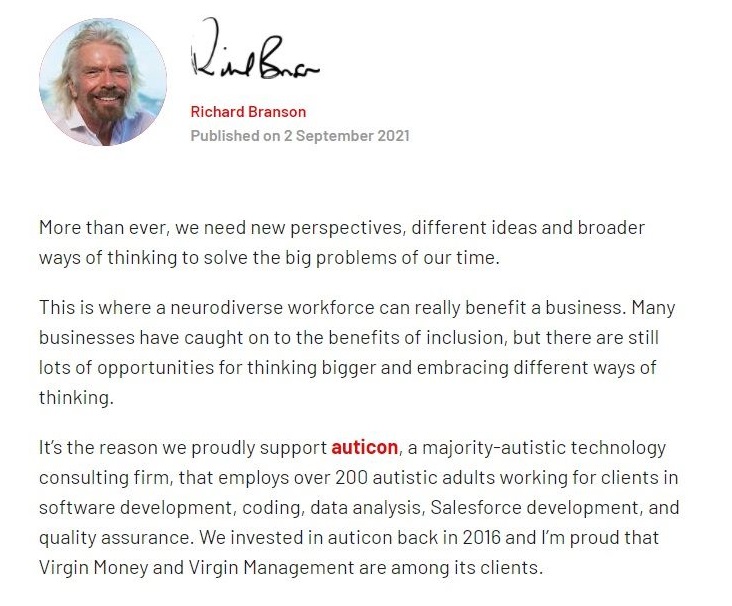
From The benefits of diversity and inclusion (Russian):
"Autistic people are able to look at familiar things from a different perspective, and tend to combine ideas from different fields (e.g., physics, biology, geography), and find some implicit solution at the fields junction that turns out to be most beneficial - this is innovation. Autists tell only the truth, don't gossip, and don't waste their work time on intrigue, because these are all very complicated social behaviours for them, and they never aspire to it, and are simply not capable of it."
To managers and supervisors: Communicate clear and unambiguous expectations
For the work to be successful, formulate tasks unambiguously and communicate information in the most straightforward manner since many autists have low tolerance to uncertainty. If you have to convey an idea, describe it as directly as possible - do not imply it. Never mean anything - always say or write things literally. Don't make the autistic person try to guess what you intended to say or what you missed in your incomplete description.

However, if an autistic worker has received precise, clearly articulated and full technical task (ideally broken into small segments), they will most probably complete even a very complicated assignment at the highest quality level.
If clear communication is established, everyone wins - this will make the life easier not only for autistic people, but also for their supervisors and co-workers.
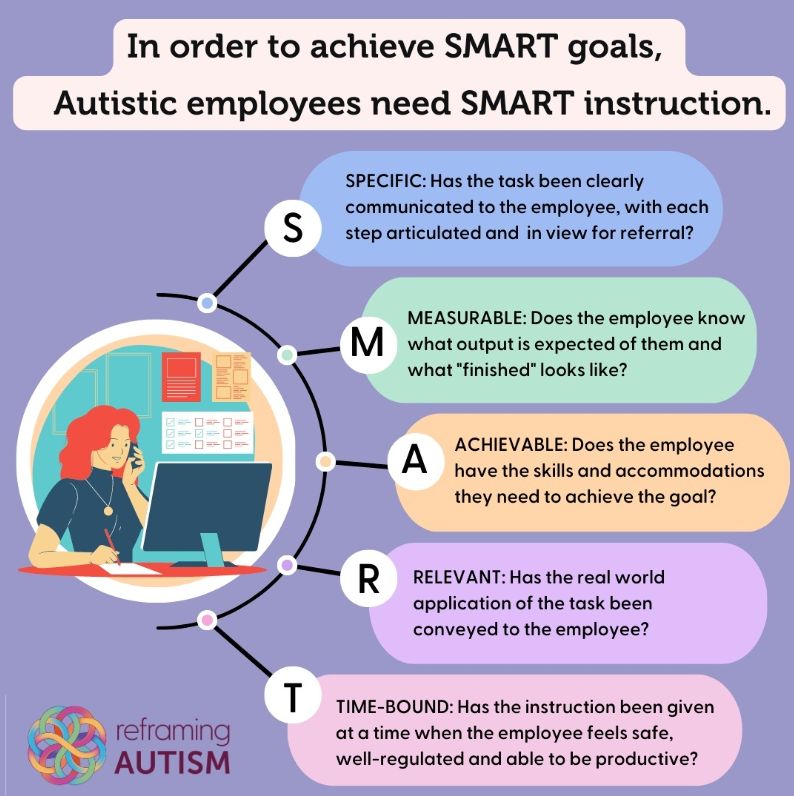
Here's how ChatGPT answered my question:
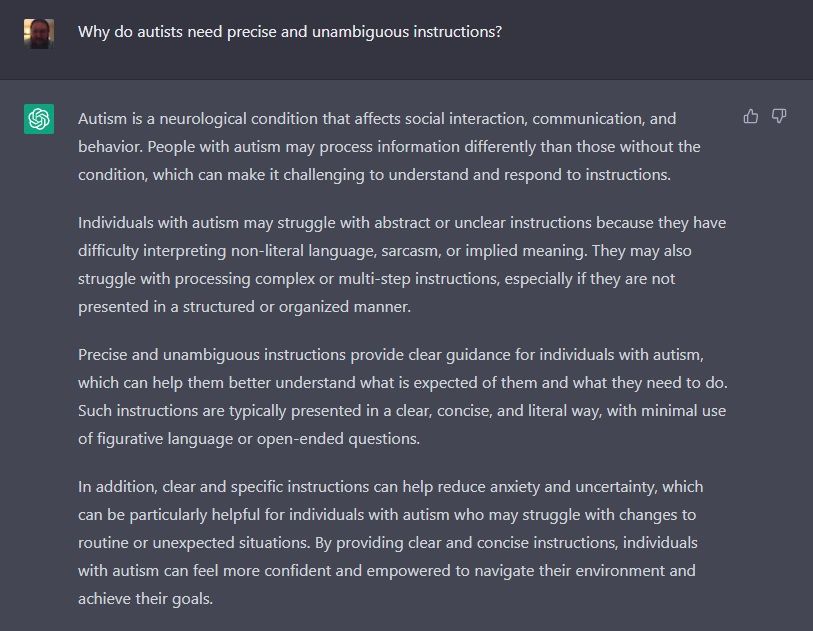
From Is My Company Ready to Hire Employees with an Autism Spectrum Disorder?:
"Set Clear Instructions and Be Specific in What You Want
When giving out an assignment or specific task, individuals with autism benefit greatly from clear direction. If possible, providing written step-by-step instructions will greatly improve your employee’s ability to perform at their highest capacity. If it is not possible to provide such instruction, assure them that they can always seek assistance if they feel the responsibility is unclear."
From It's a Neurodiverse Universe:
"Autism is characterized by differences in social interactions and communications. This makes clear unambiguous instructions on the job highly valued (preferably written) and regular feedback super important, so the employee knows when they are doing it right!"
From Best Practices for Training and Developing Employees with Autism:
"When training and developing autistic employees, be sure to offer them clear instructions on what is required of them, as they will likely follow everything you tell them explicitly and literally with extreme attention to detail. Don't expect them to make inferences or to understand or follow insinuations."
From The Importance of World Autism Awareness Month to the Video Games Industry:
"Autistic people communicate differently. The details of this will depend on each autistic individual, but some things that can cause miscommunication at work include a need for very specific and unambiguous instructions, a tendency to take things literally, and a need for more time to process and respond to interactions."
From LinkedIn:
"Be specific. As someone who is autistic with Asperger’s Syndrome I can easily fall into the trap of taking what someone says literally. This can and has got me into a great deal of trouble over misunderstanding what that person really wanted me to do.
If you work with someone on the spectrum, be careful with your language because I will take what you say literally. If you are vague and indecisive you will confuse me and leave me to either make an interpretation of what you have said, which may be wrong and often is, or I will ask you to clarify what you want.
In the past, this asking for clarification has not been welcomed and has led to harsh words and conflict because the person asking me to do something thinks that they made sense. Well, if I am asking for clarification then despite your protestation, you have not been specific enough.
So, if you are working with someone who is autistic please give a moment to organise your own thoughts before giving instructions so that what you intend, is what you actually say and not something ambiguous."
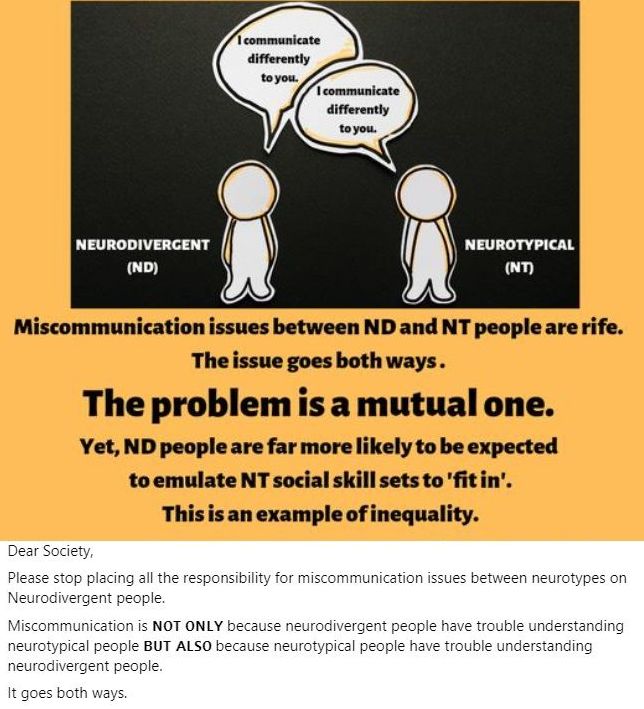

From The words we use:
"Words have power. All verbal communication uses words and it is essential that we chose the right words and the right context in which to use them so that we are clear in our intent.
Autistic people take things literally, so it is even more important that you use the correct words to get across your message. Consequently, it is important that you say what you mean and mean what you say and those are two different statements.
Take a moment to think about them, “say what you mean,” do you actually mean those precise words or should you be using other words that are clearer.
“Mean what you say,” someone with Asperger’s Syndrome will take those words as “gospel” and act upon them in the real and specific context.
The problems arise when you are ambiguous and the person with Asperger’s Syndrome has then to try to interpret what you have said and this can lead to problems, misunderstanding and even, potentially, conflict. No one wants that, so be sure to use clear, specific and precise language so that you convey what you want in an unambiguous manner. It will help you be a better communicator and this will aid smoother business and employee relations."
From LinkedIn:
"...it is essential that the communication between members of staff or management and the team(s) is clear, specific and precise. If this fails, the output will also fail and someone will be in the firing line. It is usually the person at the blunt end of the task that gets the most criticism, when, in truth, the problem or error has occurred upline from them and they may not know where that had occurred.
For autistic people, many of them have a drive to do the best they can with what is in front of them and will take pride in doing the task well. So, if you find yourself seeing errors in their work, it might be that you haven’t communicated what you want with them clearly enough, or, that that person hasn’t been adequately trained in what you have asked them to do.
It is my experience that people will try to do the best they can with what they have. There is an old adage in rugby union that you play what is in front of you and those whom are autistic will be doing just that, the best they can with what they have. It is a lesson worth learning and will hopefully avoid unjust and unnecessary recriminations when something doesn’t turn out as expected. Look to the system and lines of communication first before you label people as the source of the problem."
Uncertainty in an assignment for an autist is bullying and discrimination
Also, see the "Disclosure of the diagnosis at work and legal aspects" section below.
Companies are happy to take advantage of the strengths of people on autism spectrum, but management must take their characteristics into account. Giving autistic people vague tasks means asking them to be different from who they are, to behave in a "less autistic" way. But autistic people are the way they are, not because they choose to be, but because that is how nature made them.
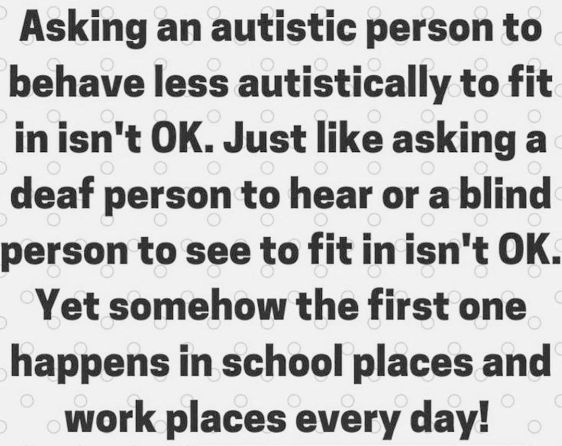
Concreteness and certainty benefit everyone, not just autists
The following quotes show that introducing autism-friendly practices improves the performance of the entire company, i.e., it is financially beneficial to the employer to include autistic people:
From Accessing neurodiverse talent key to filling skills gap:
"It is amazing how ambiguous our communication can often be. At best our colloquialisms and shorthand are confusing, but for someone who is neurodiverse these sorts of statements are completely nonsensical and can be extremely hard to navigate. Crucially, HR leaders can pave the way by encouraging all employees to be conscious of using clear and specific communication – it is good practice for everyone, not just those who are autistic."
From The benefits of diversity and inclusion (Russian):
"For direct supervisors, often the principle of «Say what you mean and mean what you say,» which they are simply forced to implement with the arrival of a neurodivergent employee, benefits others as well. «We've learned that saying what you mean and meaning what you say is very important... We give everyone clarity up front. We all want clarity.»"
From How and why to embrace neurodiversity in the workforce:
"If you have a more neurodiverse workforce, it challenges and improves people’s approach to communication, management and teamwork. For example, if a team member requires concise, unambiguous instructions and task allocation, people will start to pay more attention to their communication generally. There are a lot of ancillary benefits to bringing neurodiversity into a team and you will raise the game for the entire team. Also, if you have autistic people doing what they do best, you also free up neurotypical [i.e. non-autistic] people to do what they do best. It’s a winwin, provided you approach it in an open and inclusive manner, where people are confident to speak out about where they have strengths and shortcomings."
About programmers
In the IT department, there should be a layer between the business and the software developers - a tech lead or a system analyst who translates the requirements from the business language to the technical language that is understandable to developers and extremely univocal, i.e. never allows for the possibility of double understanding of what is written or the need to guess what is not written.
The next rule is very important for autistic people. By the way, following it will make any project more successful and save the company a huge amount of money anyway, even without any connection with autists:
The technical design specification should be so precise and comprehensive that programmers would not be required to understand the business for which the application is being written, except for a superficial understanding of the main entities.
The rule is simple: business analysts decide WHAT to do, developers decide HOW to do, no one does the work of another.
Programmers cannot be expected to be experts in the business - they have no education in this field. This is what makes it easy for them to switch business domains moving from one company to another. Programmers are experts in an absolutely different profession - software development (in the same way as construction workers are not experts in architecture).
To managers and supervisors: Check for understanding
From Autistic Employees May Process Instructions Differently Than Intended:
"I've said, “I didn't know I was confused,” many times in my life, but the truth is, I wasn't explaining myself correctly. It wasn't that I felt confused and didn't seek out clarification, I didn't feel any confusion. When I was doing the task, I felt nothing but confidence and believed with every fiber of my being that I was doing exactly what was asked of me. It was only when I turned in the project that I had an inkling that I didn't do what was asked of me, but what my brain interpreted as what was being asked of me – which were often two very different things.
Providing literal, step-by-step instructions with visual aids can be of immense benefit to your autistic employees. It reduces the mental strain of trying to decipher hidden meanings so they can focus their energy in a much more productive way – on the project itself! However, even clear, detailed instructions can sometimes be processed differently than how you intended them, so before you leave them to it, check for understanding. Hearing your instructions repeated back may help you discover a gap you weren't aware of because, in your mind, that particular step “goes without saying”.
Your autistic employee may turn in an assignment wrong even after you've provided step-by-step instructions, visual aids, etc., and this can be due to processing differences, hidden expectations, and invisible knowledge gaps. This is why, in addition to making your instructions accessible, it's important to check to see if those instructions have been accessed the way you intended by checking for understanding.
Someone who processes information differently isn't “purposefully obtuse” or trying to be difficult. They simply process information differently, and that's all there is to it. When you check for understanding, you'll not only prevent mistakes, you'll have a unique opportunity to learn more about the autistic brain, which helps build lasting mutual trust."
Asking clarifying questions by autists
Often autistic people ask a lot of questions to understand a new task and determine exactly what is expected of them. Usually, before autists begin to perform a task, they want to make sure that they understood it, namely:
- The task is correct. What is written actually corresponds to what the author wanted to say, and doesn't mean something else.
- The task is unambiguous and can be understood in one way only.
- The task is complete. The author specified ALL the necessary details, did not forget anything and does not assume that the reader will guess something or extract it from the context (for example, in the program specification, the business analyst described non-obvious behavior in ALL possible situations, and not in just two or three the most likely ones).
From Autistic Communication Differences & How to Adjust for Them:
"If we ask the same thing again and again, we don't fully understand it. It's often because neurotypicals leave out details, or we have different expectations about what things mean. We don't always make the same connections. Please take time out to go over it with us in full detail so we better understand what you're telling us."
From Your Autistic Employees Need to Be Allowed to Ask Clarifying Questions:
"Regardless of neurotype, when someone is new to a job, they will have a lot of questions. However, autistic people will ask questions more often and, in more depth, than their neurotypical counterparts because multi-part questions serve a very specific purpose for the autistic brain.
Let's say you're explaining a new procedure to your autistic hire. Since many autistic people struggle to process verbal instructions, they will likely ask a lot of clarifying questions to aid their understanding. Although it may be irritating to be interrupted, understand that stopping to answer these questions is paramount to your new hire making sense of and being able to carry out the task you set for them.
For example, when I'm given verbal instructions, I assimilate only 25% of what I've heard. However, once I ask the first set of clarifying questions and receive clear, concise answers, I understand about 50%. Once I ask another set of clarifying questions, I'll understand about 75%. I then continue asking clarifying questions until I understand the instructions 100%.
The more clarifying questions autistic people ask, the clearer the picture of what's expected of us forms in our minds."
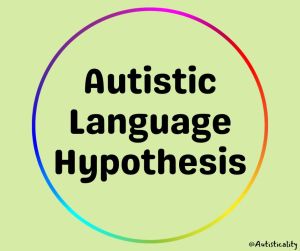
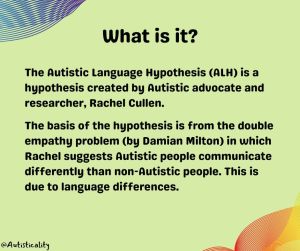
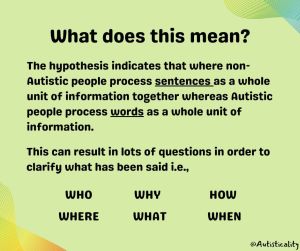
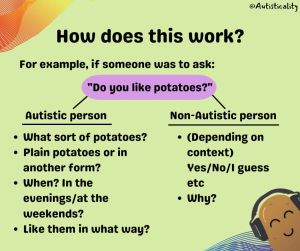
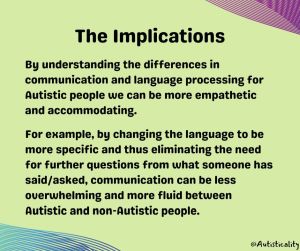
There is a brilliant article dedicated to questions, asked by autists, and possible negative reaction of neurotypicals (which think the answers to these questions are obvious): Autistic People Ask Questions to Get Answers – Period.
Limited abstract, analytical and strategic thinking
The reason for the need for clear instructions is the insufficient ability of many autists to think abstractly and see the "big picture" - they perceive the world not as a whole, but as separate elements. Their thinking is limited to the specific details that are in front of their eyes. The brain concentrates on these details, hypertrophies them, and fills the entire consciousness with them. Capturing cause and effect relationships and understanding big concepts are limited. The monotropism underlying this phenomenon is described here (this link is given at the beginning and end of the page, so you can read it later).
Abstract thinking is considering concepts, making generalizations, and thinking philosophically. Researchers have found that many people on autism spectrum may have trouble with abstract and conceptual thinking, which leads to inability to understand complex business processes, as well as with strategic thinking, problem solving and making important decisions, which require colossal skills in comprehending abstract situations (Associations between conceptual reasoning, problem solving, and adaptive ability in high-functioning autism).
Many autistic people rely heavily on concrete thinking. It's reasoning that is based on what they can see, hear, feel, and experience in the here and now. It's sometimes called literal thinking, because it's reasoning that focuses on physical objects, immediate experiences, and exact interpretations. If you need to communicate an abstract concept to an autistic person, use visual and concrete examples to illustrate the abstract idea.
From Quora:
"...autistic minds process cognitive information differently to non-autistic minds. In particular, I think, we on the spectrum need to see concrete examples - the details - up front in order to "get" an abstract concept, where a non-autistic person might be happy with a succession of vague descriptions in terms of other nebulous abstractions that may eventually flesh out the concept.
This is not so much a difficulty in using abstract concepts that the autistic person already understands - autistic people can excel at using abstract reason. The difficulty lies in acquiring new abstract concepts: until the autistic mind can see the sensory details of a working example in action, the concept feels unreliable, scary, lacking any boundaries or definition. We build abstractions from details, not from other abstractions.
I am a postgraduate in philosophy, and achieved high marks in mathematics. I am happy working with abstract reasoning, but I still experienced difficulty when lecturers tried to explain one abstract concept in terms of other abstract concepts. I needed to work through a concrete example, to see the abstraction embodied in it, and then I was free to use the abstract concept - and even apply it to unconventional situations."
Focus on one task - key to success. Multitasking - key to failure
Many autists are in need of a stable daily routine and easily get anxious about any changes in it. A predictable schedule markedly reduces anxiety and allows them to successfully cope with tasks.
From Best Practices for Training and Developing Employees with Autism:
"...don't expect most employees with autism to switch their schedules around or be comfortable with changing their assigned tasks and duties at the last minute, as they often excel in environments that offer routines and structure."
From Autism-friendly (Wikipedia):
"There are several factors in creating a supportive environment. One of them is adherence to a standard routine and structure. Since change of routine can be quite anxiety-producing for many autistic people, a structured, predictable routine makes for calmer and happier transitions during the day."
From The benefits of diversity and inclusion (Russian):
"Consistency, it is desirable not to assign several tasks to an autistic person at the same time. Or simply set the task in the form of an algorithm, rather than throwing it all together, often inconsistent either in terms of time or resources - «he is an adult, he will figure it out, arrange and rank it himself». Because of perfectionism, most likely an autistic person will perform according to the principle «I will die, but I will do everything high-qualitatively»."
Task switching is a serious problem for autistic workers. It is a very destructive idea to force them to do something new if they have not finished the current task yet, and then return to the previous assignment: multitasking leads autistic people to rapid exhaustion, sensory overload and physical and emotional burnout.
From the video How To Spot An Autistic Adult - Top Signs & Traits Of Autistic People:
"Тhey [autists] tend to struggle in multitasking - managing multiple tasks, demands, or even interactions. For me as an autistic adult, I have a strong urge or need that I must complete a task before moving onto another task. And there may not be any logical reason why one task is more important, maybe to other people, but for me, this must be done before I can do this. And I would put this sign under the banner of executive function, okay? So we have executive function challenges. Like for example, in my case, not being able to appropriately prioritize tasks. So an example for me is I can put certain tasks first. I can make them a priority, while to others, they're not actually important or the priority, but in my mind, they are."
From Avoid Interrupting Your Autistic Employees Unless It’s Important:
"Many autistic and ADHD people have what is colloquially known as ‘task inertia’, which means it can be really difficult for us to get started on a project, but once we do get started and go into hyperfocus, it can be equally as difficult for us to stop working on said project. And being interrupted while in hyperfocus is the worst. Imagine a person sitting in their cubical, working diligently. Above their head, dozens of threads of every different color swirl into a complex tapestry that connects multitudes of thoughts, ideas, and images that all move and flow together in harmony. Now, imagine someone coming by with a pair of scissors and cutting all the threads, and all those creative images, thoughts, and ideas go dark like the power going out on a city block. That’s what being interrupted in hyperfocus feels like for an autistic or ADHD person. It can take hours for your autistic or ADHD employee who was in hyperfocus to regain the momentum they had. This is why it’s so important to only interrupt them if the situation is dire, or if the information can’t wait."
If the employer or the manager wants to get excellent results, then the best thing is to provide the autist with clear instructions and leave them alone, giving them the opportunity to finish the work with no distraction.
When you get to this point, you may be thinking, "What does all that have to do with autism? Anyone would be happy to get clear assignments, and anyone dislikes jumping from task to task". Alas, there is a great distance between "disliking" and "being hardly able, and suffering if you are forced anyway". Imagine that at work you have to constantly run up and down the stairs. That probably wouldn't make you happy. Now imagine having a job like that for a disabled person with a prosthetic leg. The strong difference between autistic and neurotypical people does exist on a physiological level, even if it is not catching the eye of the bystander, and the limitations and suffering of autists are not fictional, although it is difficult for you to understand what this is about if you are not autistic. Read an excerpt from the article The mechanics of autism (Russian):
"People with ASD [autism spectrum disorder] prefer to live a routine. Days, weeks and even months are scheduled. Things and objects should be in their usual places. Recurring events and actions are elevated to the rank of ritual. In these circumstances, any unforeseen situation causes panic, breaks the world to pieces. People with ASD may feel like the world is out of control. Hence - confusion, anxiety, panic and disorientation in space. An autistic person always needs time to process new information."
From Inflexibility may give pupils with autism problems in multitasking:
"...people with autism may find it difficult to multitask because they stick rigidly to tasks in the order they are given to them, according to research led by an academic at the University of Strathclyde. The study also found that difficulty with 'prospective memory' - remembering to carry out their intentions - may contribute to the challenges they face. The pupils with autism achieved tasks when they were given to them singly but difficulties emerged when they were asked to interleave the tasks with each other. There was no difference in the time taken by the groups but the pupils with autism completed fewer tasks."
From Is it harder for an autistic to multitask?:
"Part of the neurological make-up of autism is wired to hyperfocus on very specific tasks or interests at one time. This is a way of easing anxiety and reducing overwhelm.
Although having intense, narrow interests is not a part of the diagnostic criteria for autism, repetitive and restricted behavior is and these two tend to go hand in hand. Because we get so hyperfocused in our interests, some of us may have to structure a repetitive routine in order to allow us this freedom of time; otherwise we can get completely absorbed and may lose track of time completely.
We tend to be fixated on the next most important task to us and if we get distracted we can quickly lose momentum and struggle to get back into what we we're doing, or get too caught up with the distractions that we forget what we were doing to begin with.
We tend to not be very good at shelving something temporarily unless we know it's something we can do quickly and immediately, or we write it down, so that not too much of our attention is taken away from the initial task. It's common for us to not be able to stop once we get started with something and we may be unresponsive to distractions or get agitated with unexpected setbacks.
It can and does work on a deeper level too. For instance we might be reluctant to have too many commitments because we can get too overwhelmed and distracted with options or feel too compelled to try and balance them all, which can lead to burnout out or lack of productivity.
We're also precise and like to take longer with something to a satisfactory level. This means we can fall behind in what is expected of us daily and means we might struggle to pay attention to other things because of how deeply committed we are.
Autistic people are very all or nothing orientated because our sensitivity makes us love deeply and this makes multi-tasking very challenging for us. Many of us can learn to some degree to improve our multi-tasking skills, but it can be exhausting to keep it up."
Multitasking is bad for anybody, not only for autists
If multitasking is mentioned in the description of an IT position, it means that the work in this company is most likely inefficiently organized. Multitasking is less efficient because it takes extra time to shift mental gears every time a person switches between tasks. For example, distracting a programmer from work every time to find and fix a production bug (instead of hiring an application support analyst) is a very expensive practice for a company. After all, a significant part of the highly paid time will be devoted to repeatedly "rearranging" for suddenly arising tasks, and then returning to the main job
From The Forbs: Multitasking Damages Your Brain And Career:
"Multitasking reduces your efficiency and performance because your brain can only focus on one thing at a time. When you try to do two things at once, your brain lacks the capacity to perform both tasks successfully. Research also shows that, in addition to slowing you down, multitasking lowers your IQ. A study at the University of London found that participants who multitasked during cognitive tasks experienced IQ score declines that were similar to what they'd expect if they had smoked marijuana or stayed up all night. IQ drops of 15 points for multitasking men lowered their scores to the average range of an 8-year-old child."
From Multitasking: Switching costs:
"Although switch costs may be relatively small, sometimes just a few tenths of a second per switch, they can add up to large amounts when people switch repeatedly back and forth between tasks. Thus, multitasking may seem efficient on the surface but may actually take more time in the end and involve more error. Even brief mental blocks created by shifting between tasks can cost as much as 40 percent of someone's productive time."
Well, 40% is probably an exaggeration, but the waste of time for autists is definitely considerable. Moreover, this is not just a waste of time, but also enormous efforts and anxiety, which cannot but affect the overall quality of work.
Work may be interrupted not only by other tasks, but also... by the manager
Constant control by a supervisor is similar to the multitasking problem, but is much worse. There's an excellent post on LinkedIn about this. Here is a fragment:
"Having set out the instructions clearly the manager needs to back off and allow each member of the team to do their work and not to hover over them all of the time. Allow them to do their job and to use their skills and abilities to shine through. If the manager is constantly badgering them and criticizing them or correcting them the individual will not be able to do their best work, they will become stressed and this can lead to mistakes, overwhelm and conflict.
For someone with Asperger's Syndrome, it is essential that the lines of communication are clear, the instructions have been made in a specific and concise way and a system is in place that allows the person to ask questions if necessary. Other than that, leave them alone and let them get on with their work. Having a micromanager hanging over them like a bad smell will be counter productive and will create an atmosphere of mistrust and disharmony.
The last thing someone with Asperger's needs is a constant haranguing from a manager who is a control freak. This will not lead to productive work or innovation. It will, however, lead to absenteeism a stressful workplace and staff who are just there to collect a pay cheque at the end of the month.
Give all of your staff the tools to shine and leave them alone to thrive and you will be amazed at what they can do if you trust them and support them in the right way."
Information processing speed and slower work pace
Why do many autistic and ADHD people work at a slower pace?
What Is Slow Processing
How to Support an Autistic Employee Who Needs Extra Processing Time
From Do people with autism on average have slower processing speed?:
"From what I can tell, it’s not so much that autistics have a slower processing speed as they have different processing priorities. Their hardware is different, built to do things differently, so whenever they are given a task that would be considered “normal” for “normal people”, they might require more time to finish said task. Part of the reason for that is that they have to translate the “normal” task into something their own hardware can work with. Or figure out what was asked of them to begin with.
Unfortunately, society does not offer autistics much opportunities to perform tasks they were meant to perform, so a lot of the time is spent processing and understanding the tasks given to autistics prior to actually completing them.
Being clear and honest about what you want them to do might speed things up and they will perform said task to the letter.
If neurotypicals can be said to operate in Windows, and being the majority, have all their programs built specifically for Windows, autistics instead operate in some variant of Linux. Which variant? That is different for each and everyone of them. Glitches will occur if you do not install a compatibility patch.
...
Research suggests that people with autism on average have slower processing speed. Slow processing speed can mean that it takes longer for a person to take in information via the senses, and they may not be able to work out what to do in a given situation because there is too much information coming in for them to keep up with it all.
...
Autism and Asperger's syndrome are known as learning disabilities. But I prefer the term developmental delay, because ‘disabled' implies we are incapable, which is false. We are very capable, we're just late bloomers.
There are a few factors that interrupt our processing speeds:
Problem solvers: Due to our ability to think deeply and analyse thoroughly, it can mean we process things slower than a neurotypical. We are good problem solvers and in order for that, we have to be good at first noticing a problem and paying attention to detail. Being a problem solver can delay our processing speed of more simple concepts because we might notice something that someone else wouldn't or make the problem out to be bigger than it is.
Perfectionism: Our perfectionistic tendencies may interrupt our processing speeds because we don't want to rush to assumptions and want to fully explore every avenue. We tend to avoid making mistakes that contribute to learning, so we may not comprehend certain things at all, or at least until later than our peers.
Special interests: We often get distracted too, which may interfere with processing speeds. Our minds may be too hyperfocused on our interests, which can interrupt thinking.
Anxiety: We may be anxious due to pressure of trying too hard to process things as quickly as others, which just causes more delay.
Sensory issues: Then there's sensory issues, or too much input that can cause a shutdown, or a meltdown, further delaying cognitive ability."
From FB:
"Processing speed is different from processing ability.
Sometimes, when a person realizes I have poor processing speed, they automatically assume I have poor processing ability. Their tone becomes more singsongy, their vocabulary more childlike, and their expressions more performative – thinking this makes it easier for me to understand.
It's like they've never considered the possibility that a person can be both smart and slow.
I can't handle a barrage of facts, descending haphazardly into my mind like Tetris. I freeze up, game over.
However, I can handle extremely complex information if you give it to me one bite at a time... with pauses in between to digest each new fact.
Everyone deserves respect, regardless of processing speed or ability. But remember that those are separate needs with separate accommodations, and they don't always overlap."
Decidophobia - decision-making indecisiveness and anxiety
The material has grown so much that it had to be allocated on a separate page.
Seeing once is better than hearing twice
This saying perfectly describes autistic people, who perceive written information much better than heard information:
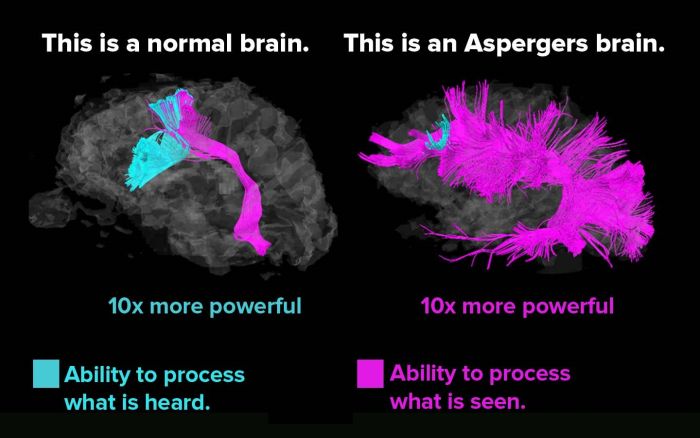
This should be taken into account by managers and colleagues of autistic employees. If you want to communicate information to an autistic worker that requires deep comprehending, do not do it verbally - rather, send an email with the facts listed briefly.
It also makes sense to shield the autistic employee as much as possible from business meetings that combine the need to perceive verbal information with live communication with people. A neurotypical person will never understand the effort, stress and suffering autists are facing in such meetings!
Problems with job interview and employment

Unemployment rates among autistic people are unacceptably high (in fact, they are even higher than the rates in other disability categories, including learning disabilities, intellectual disability or speech-language impairment). And it's not because we're unworthy or incapable. Recruitment processes and many workplaces are not autism-friendly.
In general, it's more difficult for autists than for neurotypical people with the same qualifications to pass a job interview. Even if an autist has tremendous knowledge and experience in the profession, they may not pass the selection stage. The company will not get a valuable employee who would have been of great benefit for many years, just because it tested them using methods that are not applicable to them. Perhaps that company will hire a lower quality worker who has excelled in the art of self-selling on the job market.
From Autism Doesn’t Hold People Back at Work. Discrimination Does:
"The personality-focused job application process is a barrier for many people who may be better at performing the job than at talking about themselves."
From the video People with autism recruited for skilled jobs:
"An interview is a barrier for an autistic applicant in the same way as a step might be a barrier for a person who's confined to a wheelchair."

In my 20+ year programming career, I have worked for 6 different companies. In other words, 6 times I successfully passed the interview (actually 8 times - 2 times I refused to accept the job offer for some reason). But only one of them included a technical assignment. Fortunately, I was left alone for a couple of hours, and I successfully coped, beating out several competitors (more on this below). Other interviews were just a conversation (two of them by phone) - I was asked questions about work, and answered them verbally. The interview at my last job was amazing - my future boss first talked about the project, and then we just casually chatted about life and even told jokes! At the end of the interview, I asked if he wanted to ask me technical questions. His answer was logically flawless: "Why should I do extra work? I've studied your resume, you've worked in various companies for many years. Since you were kept at them, that means I can rely on those who hired you."
But I also had a failed interview. I was given a technical task, and I had to complete it right in front of the interviewers. I was told to write a database query. This is exactly what I had been doing for two decades every day. The query was pretty simple (not at all comparable to the art of database querying that I had to demonstrate more than once in real projects). People were sitting there looking at me, and I couldn't concentrate. It was like I was in a daze, so I've done everything wrong that I could. It's as if an experienced truck driver who has driven all over North America could not drive 10 meters in a straight line.

From Autism-friendly apprenticeships:
"Autistic people can face significant obstacles with interviews and applications because of difficulties with social interaction and communication and may need a range of reasonable adjustments. Alternative forms of assessment should be considered, including work trials and/or supplying interview questions in advance. Autistic people have told us that they often find large entry exams difficult and so they might not score as well, for example if they needed extra time or if questions are not clear."
From the video Autism and Job Interviews:
"Autistic people have hard time at job interviews no matter how well-dressed they are, or how well prepared they are, or how hard they've tried really, because job interviews are a highly neurotypical social dance, and it's frustrating because recruiters and employers can't see how valuable autistic people can be."
Disability is not the problem
The social model of disability implies that the person isn't the problem, the disability isn't the problem. Barriers are the problem. By definition, barriers are anything physical, architectural, technological, attitudinal, or based on information or communications, or result of a policy or practice that hinders full and equal participation. Accessibility falls from that. Accessibility is essentially the absence of those barriers. It is the proactive removal of any barriers, so that everyone, regardless of ability or disability, can equally access income, products, services, communications, culture, policies, built environment and so on.
From Career Choices for People with Autism: First Hand Advice:
"Many people struggle with finding a job and establishing a career for themselves. In addition, there are often multiple applicants for only one job vacancy, which can be discouraging to any jobseeker. However, for people with Autism Spectrum Disorder (or ASD), this search is often much more difficult. The social difficulties that result from ASD can cause these individuals to struggle in job interviews and in finding a work environment that is appropriate for their needs."
From Accessing neurodiverse talent key to filling skills gap:
"At auticon, a social enterprise which exclusively employs autistic adults as IT consultants, we bypass many of the traditional HR practices (such as formal interviews) that can often disadvantage autistic talent. For some roles, especially those with a strong technical requirement, it is possible to find quality talent through a series of more generalised assessments and diagnostic tests to check aptitude and skills, followed by more relaxed and informal ‘conversations’ that significantly reduce much of the pressure and anxiety that so often goes hand-in-hand with the traditional assessment systems."
From the video Autism: Neurodiversity at Work Works Best:
"Chase Bank reports that their autistic employees are 40% more productive than a comparable non-autistic employee group. Neurodiversity is productive. However, it's really important to understand that only approximately 20% of Americans who have autism can actually hold a competitive job, and many of them are never hired despite being well-qualified. Why is that? I'll let you in on a secret. Companies select based on fit. And "fit" is a cover word for "bias." Microsoft is changing that. They've sought out autistic candidates. They've changed their interview process. They've given them more time to showcase their abilities. And clearly, Microsoft is an organization that is interested in hiring substance over fit. In addition to being productive, neurodiversity is innovative!"
From How to Support Neurodiversity in the Workplace:
"While HR leaders now are aware of the advantages that organizations can gain from hiring employees with diverse educational, gender, racial and cultural backgrounds, the benefits of neurodiversity – the range of differences in thinking and behaviour – are less understood.
Though neurodiversity can enhance a company’s ability to innovate and problem-solve, many people with neurodevelopmental differences (like those on the autism spectrum) face less-than ideal experiences in the workforce.
“When I first entered the workforce, companies often lacked any understanding of either recruiting neurodivergent job applicants and/or supporting this group,” says David Moloney, a self-advocate who is on the autistic spectrum, Mutual Fund Indexer at CIBC, and board member at Autism Ontario. “Such misunderstandings often lead to either underemployment or, sadly, unemployment for these individuals.”
Considering all the benefits of a neurodiverse workforce, why is neurodiverse talent still overlooked? It starts with attitudinal barriers, bias, discrimination, and fears around neurodiversity. Many organizations adopt inflexible hiring, retention and training practices. Many corporate structures are modelled without a neurodivergent candidate in mind. For example, traditional interview questions like, “What is your weakness,” will likely be interpreted and answered quite literally and bluntly without decoding what is really being asked in that question. Many individuals on the autism spectrum process information and communicate in different ways so a typical interview setting can sometimes obscure a candidates’ qualifications, skills and overall fit for the role. When it comes to hiring, HR leaders should consider alternative methods for evaluating skills. This can include job shadowing [link] and/or work trials where hiring managers can assess if a candidate is a good fit in a practical way."
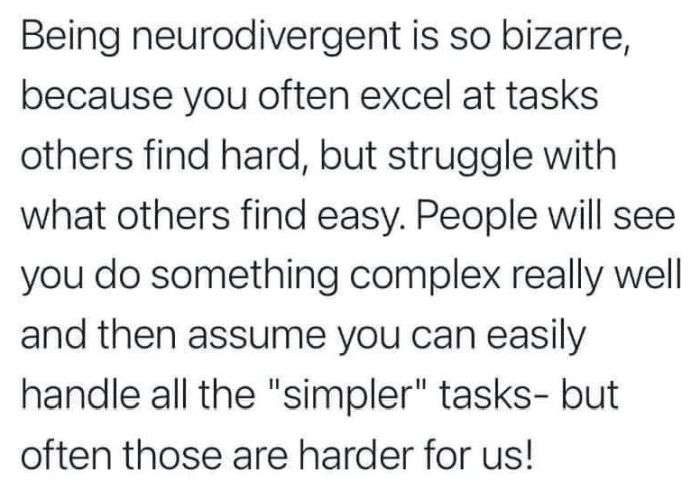



Employers and supervisors can help an autistic person be productive and successful at work. If they understand how to leverage their autistic strengths (for example, with the already mentioned clear guidelines), then they are likely to get the best and most loyal employee.
Something curious happened to me many years ago. It is possible that autism was the reason that I did not lose my job, but... found it! I was doing a technical interview for a database developer position at Motorola. I was told to create two screens: one with a list of something there, and the second (which opens by double-clicking on this list) for inserting and editing individual records. It seems like a trivial matter, but I decided to first create a small framework (a library of universal classes), and then build the screens based on that framework. Moreover, the creation of the framework took 90 percent of the time (in fact, they exist for this - in order to quickly create final objects on their basis). When I came to work on the first day, the boss said:
- There were a lot of applicants. Do you know why I selected you? Because you were the only one who firstly created a framework - the rest immediately rushed to write the screens.
But using frameworks is the right way to create programs, I just couldn't do otherwise! Now I understand that this was a phenomenon of the same nature as putting toys in a row among autistic children, and adherence to routine among many autistic people: the order should not be disturbed!

Disclosure of the diagnosis at work and legal aspects
Autism Disclosure in Interview
Diagnosis Disclosure & Masking
From the LinkedIn Learning course Hiring and Supporting Neurodiversity in the Workplace:
"Creating a climate of disclosure will help alleviate these challenges and, as a result, provide an environment where all employees can do their best work.
Disclosure is a decision to reveal an official diagnosis openly. It is one of the most challenging decisions for an individual with a concealable disability to make. You see, the stigma associated with neurodiversity is one of the most significant reasons candidates, employees, do not disclose. The reason to not disclose align tightly with the reason individuals select a social camouflage. To disclose is to be vulnerable. Many neurodivergent, they want to fit in and they want to pass as a normal person. Neurodivergent also keep their diagnosis to themselves to avoid retaliation and bullying by others, and manage impressions made to others.
So, why is disclosure important?
First, formal disclosure can create protections for the candidate or employee. In many countries, disabled people are considered a protected population. This means that it's illegal to discriminate against someone because of their disability. If an individual's impairment substantially limits one or more life activities, they will fall into this protected group. The concealable or non-visible aspect of many neurodivergent impairments makes it difficult for human resource managers to support proactively. Because of this challenge, it is critical that individuals feel comfortable in the work climate and the culture to disclose and ask for the help they need to do their best work."

Discrimination of autists is prohibited by law in the same way as any other discrimination - for example, on the basis of another type of disability, as well as gender, race, religion or sexual orientation. Information for your country can be easily googled.
Your employer has no right to force you to do something that you are physically incapable of, or that causes you pain and suffering because of your natural characteristics.
The Human Rights Code, the Canadian Human Rights Act, and the Canadian Charter of Rights and Freedoms protect employees and others from discrimination and harassment on the basis of an individual's personal characteristics including disability.

If you believe you have experienced a violation of rights (discrimination or harassment) at work, seek a legal advice - contact a lawyer which specializes in Employment Law and inquire about filing a lawsuit. Don't take any steps without a lawyer!
In case of an invisible disability (e.g. autism), most likely, your employer or manager cannot guess that you have faced a problem. Therefore, you need to notify them. This should be done not verbally or via chat, but via email only. Send it from your personal (not work) email, and add the lawyer email to the "secret" CC - this will serve as the disclosure proof in the event of a court action (especially if you will be fired after that disclosure - unfortunately, this sometimes happens, but it makes the lawyer's job easier because the bias and the discrimination become obvious). In Canada, you can file an employment discrimination complaint to the Human Rights Tribunal. In the USA, file a case with the Equal Employment Opportunity Commission (see the Discrimination and Harassment at Your Job page in the USA Government site) or the state fair employment practices agency.
I highly recommend buying this book on Amazon: Autism, Discrimination and the Law: A Quick Guide for Parents, Educators and Employers. Here is a short excerpt from the Introduction:
"People who provide services of any sort have to make adjustments to those services to prevent people from being discriminated against.
This means that people with disabilities can no longer expect just to be included: the service must adopt to the person with the disability by making reasonable adjustments.
It is no longer about support and ideas of inclusion, it's about the law.
In relation to people with autism, it could be considered discriminatory if schools, colleges, employers and public bodies fail to
• provide materials and information in a manner that the person can understand
• make adaptions to communications
• provide explicit information and explanation
• give clear and explicit expectations and rules"
Reasonable accommodation and undue hardship:
The law obliges the employer to adapt the working conditions to the capabilities of an employee with a disability as much as is realistically possible. Employers are required to incur financial costs associated with accommodation, so long as those costs don't result in undue hardship. This means that employers must support autistic people by making changes in the work environment that allow the autistic person to enjoy equal employment opportunities and do their job effectively. When properly supported, neurodivergent employees often contribute as much or more than other employees and more than make up for any cost of accommodation.
The Wikipedia article Reasonable accommodation says:
"A reasonable accommodation is defined by the US Department of Justice as "any modification or adjustment to a job or the work environment that will enable a qualified applicant or employee with a disability to participate in the application process or to perform essential job functions. Reasonable accommodation also includes adjustments to assure that a qualified individual with a disability has rights and privileges in employment equal to those of employees without disabilities."
The next two quotes from the site of Ontario Human Rights Commission:
Duty to accommodate:
"... the goal of accommodation is to ensure that an employee who is able to work can do so. In practice, this means that the employer must accommodate the employee in a way that, while not causing the employer undue hardship, will ensure that the employee can work. The purpose of the duty to accommodate is to ensure that persons who are otherwise fit to work are not unfairly excluded where working conditions can be adjusted without undue hardship."
It will probably surprise many people to learn that the concept of "undue hardship" is not vague and shapeless, but has a clear and precise legal definition.
Undue hardship:
"The Supreme Court of Canada has said “one must be wary of putting too low a value on accommodating the disabled. It is all too easy to cite increased cost as a reason for refusing to accord the disabled equal treatment.” ... Costs will amount to undue hardship if they are ... so substantial that they would alter the essential nature of the enterprise, or so significant that they would substantially affect its viability."
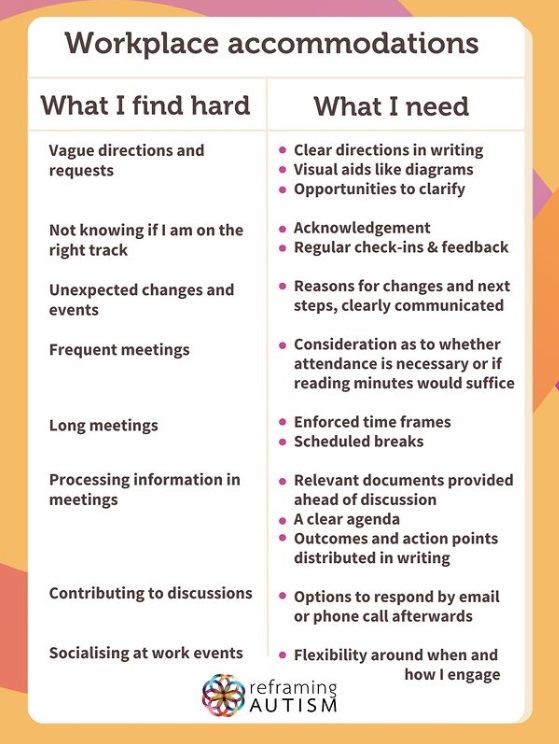
How to Disclose a Disability and Request Accommodations in the Workplace:
• Disability Disclosure Topics
• Requesting and Negotiating a Reasonable Accommodation
• How to Request an Accommodation: Accommodation Form Letter
• Requesting Accommodations for Employment Testing
• Sample Language for Accommodation Request Letters
• Practical Guidance for Medical Professionals: Providing Sufficient Medical Documentation in Support of a Patient's Accommodation Request
• Disclosing a Disability Before an Accommodation is Needed
Also, please read Autism at work - The Autistic Advocate, the sections "Have you disclosed that you are Autistic in your workplace? If yes, why? If no, why?" and "If you have Disclosed in the workplace, what was the reaction and have you been able to unMask to any degree?".
•••
Also, you might be interested in reading My characteristics in detail. That page describes, among other things, the autism traits mentioned on the page you just finished reading, and provides a lot of additional material of interest from the point of view of employment.
•••
Some links about neurodiversity in the workplace:
• Autism IS linked to higher intelligence: People with genes related to the condition scored better in mental ability tests
• 3 Reasons Autistic Children Excel at Computer Coding
• The Benefits Of Employing People With Autism
• What Genius and Autism Have in Common
• Neurodiversity as a Competitive Advantage (Harvard Business Review)
• Where 75% of workers are on the autistic spectrum (BBC)
• Auticon - a consulting company that employs IT professionals with autism in Ontario, Canada
• Disclosing an autism diagnosis to employers



Autism (Part 1) • Autism (Part 2) • Autism and job • ADHD • Monotropism
